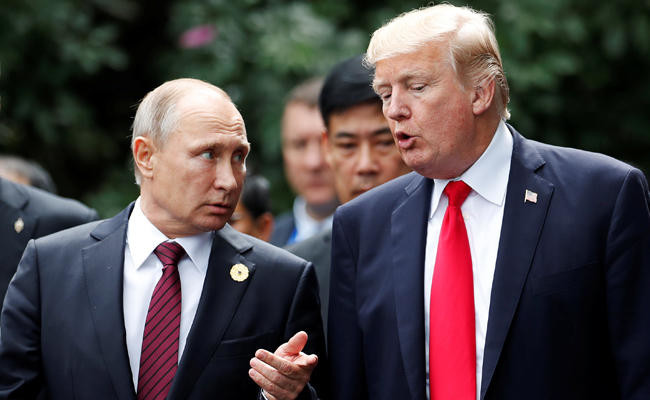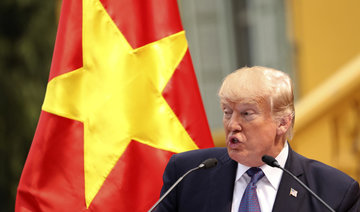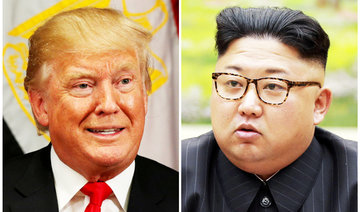MANILA, Philippines: A day after being criticized by President Donald Trump, a former CIA director questioned whether Russian President Vladimir Putin was manipulating Trump with flattery during the president’s lengthy trip to Asia.
Trump’s trip was meant to be centered on trade and North Korea, and on Monday, he will talk with Philippine President Rodrigo Duterte, who has overseen a bloody drug war that has featured extrajudicial killings. But Trump remains dogged by things he has said, and not said, about Russia.
He tried to have it both ways Sunday on the issue of Russian interference in last year’s presidential race, saying he believes both the US intelligence agencies when they say Russia meddled and Putin’s sincerity in claiming that his country did not.
“I believe that he feels that he and Russia did not meddle in the election,” Trump said in Hanoi, Vietnam.
“As to whether I believe it, I’m with our agencies,” Trump said. “As currently led by fine people, I believe very much in our intelligence agencies.”
But just a day earlier, he had lashed out at the former heads of the US intelligence agencies, dismissing them as “political hacks” and claiming there were plenty of reasons to be suspicious of their findings that Russia meddled to help Trump defeat Democrat Hillary Clinton.
Former CIA director John Brennan, appearing Sunday on CNN’s “State of the Union” with former national intelligence director James Clapper, said Trump was deriding them in an attempt to “delegitimize” the intelligence community’s assessment.
“I think Mr. Putin is very clever in terms of playing to Mr. Trump’s interest in being flattered. And also I think Mr. Trump is, for whatever reason, either intimidated by Mr. Putin, afraid of what he could do or what might come out as a result of these investigations,” Brennan said.
Clapper called the threat from Russia “manifest and obvious.”
“To try to paint it in any other way is, I think, astounding and, in fact, poses a peril to this country,” he said on CNN.
Brennan said Trump’s ambiguity on Russia’s involvement was “very, very worrisome from a national security standpoint.”
“I think he’s giving Putin a pass and I think it demonstrates to Putin that Donald Trump can be played by foreign leaders who are going to appeal to his ego and play upon his securities,” Brennan said.
Questions about whether Trump believes the assessment about Russian election-meddling have trailed him since January, when he said for the first time, shortly before taking office, that he accepted that Russia was behind the election-year hacking of Democrats that roiled the White House race.
A special counsel’s examination of potential collusion between Moscow and Trump campaign aides so far has led to indictments against Trump’s former campaign chairman and another top aide for crimes unrelated to the campaign, and a guilty plea from a Trump foreign policy adviser for lying to the FBI.
Multiple congressional committees are also investigating.
Trump told reporters traveling with him to Hanoi on Saturday that Putin had again vehemently denied the allegations. The two spoke during an economic conference in Danang, Vietnam. Trump danced around questions about whether he believed Putin but stressed Putin’s denials.
“Every time he sees me, he says: ‘I didn’t do that.’ And I believe — I really believe — that when he tells me that, he means it,” Trump said, arguing that it makes no sense for him to belabor the issue when Russia could help the US on North Korea, Syria and other issues.
In Hanoi on Sunday, Trump also pointed to sanctions the US has imposed on Russia as punishment for election meddling. “They were sanctioned at a very high level, and that took place very recently,” he said. “It’s now time to get back to healing a world that is shattered and broken.”
Trump was originally slated to depart Manila for Washington on Monday. He added a day to the schedule amid criticism that he would have missed the final summit.
In addition to meeting with Duterte, Trump is expected to attend the Association for Southeast Asian Nations conference on Monday to urge allies to pressure North Korea to give up its nuclear weapons program. And he is expected, in meetings with other leaders, to push his agenda for bilateral, rather than multinational, trade agreements.
___
Associated Press writers Darlene Superville and Ken Thomas in Washington contributed to this report.
___
Follow Lemire and Colvin on Twitter at http://twitter.com/@JonLemire and http://twitter.com/@colvinj
Putin manipulating Trump with flattery, former CIA chief suggests
Putin manipulating Trump with flattery, former CIA chief suggests

Ukraine’s Zelensky says Russian artillery fire has not subsided

KYIV: Ukrainian President Volodymyr Zelensky said on Saturday that, according to his top commander, Russian artillery fire had not subsided despite the Kremlin’s proclamation of an Easter ceasefire.
“As of now, according to the Commander-in-Chief reports, Russian assault operations continue on several frontline sectors, and Russian artillery fire has not subsided,” Zelensky wrote on the social media platform X.
“Therefore, there is no trust in words coming from Moscow.”
He recalled that Russia had last month rejected a US-proposed full 30-day ceasefire and said that if Moscow agreed to “truly engage in a format of full and unconditional silence, Ukraine will act accordingly — mirroring Russia’s actions.”
“If a complete ceasefire truly takes hold, Ukraine proposes extending it beyond the Easter day of April 20,” Zelensky wrote.
Kyiv calls on foreign troops not to take part in Russia’s May 9 parade

- “The Russian army has committed and continues to commit atrocities in Ukraine,” Kyiv’s foreign ministry said
- “These people are not liberators of Europe, they are occupiers and war criminals“
KYIV: Ukraine warned Tuesday against any foreign troop participation in Russia’s May 9 parade to mark 80 years since the defeat of Nazi Germany, saying it would be “unacceptable” and seen as helping Moscow “whitewash its war crimes.”
A handful of countries have in recent years sent their militaries to take part in Russia’s traditional May 9 parade — a showpiece event that has become the country’s most important public holiday under President Vladimir Putin’s quarter-century in power.
“The Russian army has committed and continues to commit atrocities in Ukraine on a scale that Europe has not seen since World War II,” Kyiv’s foreign ministry said.
“It is this army that will march on Red Square in Moscow on May 9. These people are not liberators of Europe, they are occupiers and war criminals.”
Kyiv said marching with Russian soldiers would be considered as “sharing responsibility” for Moscow’s actions during its three-year Ukraine invasion.
“To march side by side with them is to share responsibility for the blood of murdered Ukrainian children, civilians and military, not to honor the victory over Nazism.”
Ukraine was one of the most devastated countries during World War II, with Kyiv saying it “touched every Ukrainian family.”
The foreign ministry also said that six million Ukrainians fought in the Red Army — with five million Ukrainian civilians killed and three million Ukrainian troops.
Russian leader Vladimir Putin attributed the victory over Nazism in Europe as a feat primarily achieved by the Russian nation.
Central Asian troops have often taken part in the Moscow parade.
The Kremlin has this year not ruled out that North Korean soldiers could take part for the first time, after Pyongyang’s troops helped Moscow oust Ukrainian soldiers from Russia’s Kursk region.
UN chief: India, Pakistan must ‘step back from the brink’

- Countries should exercise ‘maximum restraint’ amid soaring tensions, says Antonio Guterres
- UN Security Council holds closed-door session to discuss dispute
NEW YORK CITY: UN Secretary-General Antonio Guterres has called on India and Pakistan to exercise “maximum restraint” amid soaring tensions between the two countries.
It follows last month’s terror attack in the Pahalgam area of Jammu and Kashmir.
Both countries administer parts of the territory but claim it in full.
The attack on April 22 killed at least 26 civilians and injured many more.
Guterres, speaking outside the Security Council at UN Headquarters in New York City on Monday, warned that tensions between India and Pakistan “are at their highest in years.”
He added: “I deeply respect and am profoundly grateful to the government and people of both countries — and their significant contributions to the work of the UN, not least UN peacekeeping.
“And so it pains me to see relations reaching a boiling point.”
The Indian government today will carry out a nationwide civil defense drill to simulate an attack on its territory.
Pakistan on Saturday test-fired a ballistic missile with a range of 450 km.
Guterres called on the two countries to “step back from the brink,” and warned that a “military solution is no solution.”
He said: “I understand the raw feelings following the awful terror attack in Pahalgam on April 22.
“I once again strongly condemn that attack and extend my condolences to the families of the victims.
“Targeting civilians is unacceptable — and those responsible must be brought to justice through credible and lawful means.
“It is also essential — especially at this critical hour — to avoid a military confrontation that could easily spin out of control.
“Now is the time for maximum restraint and stepping back from the brink.
The UN Security Council met on Monday in a closed-door session to discuss the tensions.
Guterres pledged to support “any initiative that promotes de-escalation, diplomacy and a renewed commitment to peace.”
Macron to host Syrian leader’s first European visit

- French President Emmanuel Macron will welcome Syrian leader Ahmed Al-Sharaa to Paris on Wednesday for his first visit to Europe
PARIS: French President Emmanuel Macron will welcome Syrian leader Ahmed Al-Sharaa to Paris on Wednesday for his first visit to Europe, despite growing doubts about Syria’s ruling Islamist coalition and protests from France’s far right.
Since the fall of longtime Syrian ruler Bashar Assad in December following fourteen years of devastating war, the international community has been pressing the new authorities, who have roots in the Al-Qaeda jihadist network, to respect personal freedoms, protect minorities and include all components of society in the country’s transition.
Many countries say they will monitor the new authorities’ conduct before fully lifting Assad-era sanctions.
“This meeting is part of France’s historic commitment to the Syrian people who aspire to peace and democracy,” the Elysee Palace said on Tuesday.
Macron will “reiterate France’s support for the construction of a new Syria, a free, stable, sovereign Syria that respects all components of Syrian society,” the presidency said.
Macron will also emphasize “his demands on the Syrian government, primarily the stabilization of the region, including Lebanon, and the fight against terrorism,” it said.
President Sharaa is still subject to a UN travel ban. France most likely had to request an exemption from the United Nations, as was the case for his recent trips to Turkiye and Saudi Arabia, according to a source familiar with the matter.
France, a former colonial ruler of Syria, is eyeing an opportunity to increase its influence in the country after years of Russian presence.
In February, France organized a conference in Paris on the reconstruction of Syria, in the hope of steering the fragile transition. Syria has been devastated by years of civil war, with over 90 percent of the population living below the poverty line.
Macron had first invited Syria’s new leader to visit France in February.
In March, he repeated the invitation but made it conditional on the formation of an inclusive Syrian government representing “all components of civil society,” describing his initial negotiations with the interim leaders as “positive.”
Syria’s new Islamist authorities have vowed inclusive rule in the multi-confessional, multi-ethnic country.
But sectarian clashes in March in which more than 1,700 people were killed, mostly from Assad’s Alawite minority, sparked widespread condemnation.
More recent clashes involving fighters from the Druze community, as well as reports of abuses from NGOs, have also raised doubts about the interim government’s ability to control extremists in its ranks.
Adding to pressure on the new Syrian government, Israel has also launched hundreds of strikes on the country since Assad’s overthrow, including one near the presidential palace in Damascus on Friday.
Israel has said its forces stand ready to protect the Druze minority and said the strike near the presidential palace was intended to send a “clear message” to Syria’s new rulers.
But the interim government described the strike as a “dangerous escalation,” while the United Nations urged Israel to halt its attacks on Syria “at once.”
The French far right criticized the upcoming talks.
Far-right leader Marine Le Pen accused Macron of hosting talks with “a jihadist” who has been involved with the Daesh group and Al-Qaeda, adding such a meeting would be “provocative and irresponsible.”
“Shock and dismay,” Le Pen said on X.
“Once again, Emmanuel Macron is damaging France’s image and discrediting its commitment, particularly among its allies, in the fight against Islamism.”
Foreign Minister Jean-Noel Barrot, who met with the Syrian leader on a visit to Damascus in January, defended the talks.
“The safety of French people is at stake in Syria,” Barrot told broadcaster RTL, adding it was important to fight terrorism and drug trafficking in the conflict-riven country as well as control migration.
Not engaging the leaders of Syria and Lebanon would amount to “rolling out the red carpet for Daesh,” he said, referring to the Daesh terrorists.
French companies are meanwhile eyeing a role in Syria’s reconstruction.
Last week, French logistics giant CMA CGM signed a 30-year contract to develop and operate the port of Latakia, at an event attended by Sharaa.
UK may restrict students from countries most likely to claim asylum

- High levels of legal migration have long dominated Britain’s political conversation
- Out of the 108,000 people who claimed asylum in Britain last year, 16,000 had student visas
LONDON: The British government may restrict visa applications from students living in countries that are considered most likely to claim asylum in a move designed to bring down annual net migration, a government official said.
The move comes after Prime Minister Keir Starmer’s Labour Party was punished in local elections in England last week by voters angry over issues, including illegal immigration.
The government is expected next week to publish a policy document, known as a white paper, which will set out how the government plans to reduce net migration, which reached 728,000 people in the year to June last year.
“Our upcoming Immigration White Paper will set out a comprehensive plan to restore order to our broken immigration system,” the Home Office said in a statement.
High levels of legal migration have long dominated Britain’s political conversation and were one of the major drivers for the Brexit referendum in 2016.
Out of the 108,000 people who claimed asylum in Britain last year, 16,000 had student visas, government data shows. The government does not provide a breakdown of the nationalities of those who had student visas, who went on to claim asylum.
But the government said people from Pakistan, Nigeria and Sri Lanka were the most likely to claim asylum in Britain after arriving on a work, student, or a visitor visa.
In the aftermath of the party’s poor local election results last week, some Labour members of parliament urged the government to do more to take a more decisive approach on issues such as bringing down net migration.
Jo White, who represents a group of lawmakers in previously Labour heartlands known as the “Red Wall,” said the government should stop “pussyfooting around.”




















